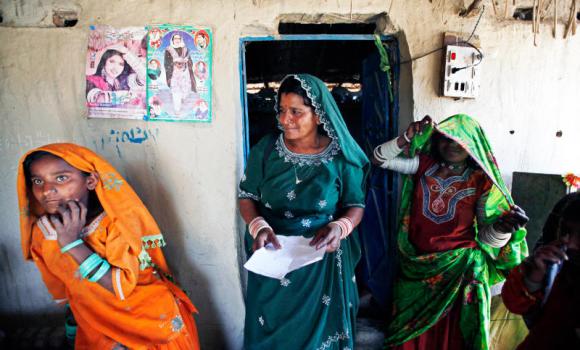HYDERABAD (Pakistan): When Veero Kolhi made the asset declaration required of candidates for Pakistan’s May elections, she listed the following items: two beds, five mattresses, cooking pots and a bank account with life savings of 2,800 rupees.
While she may lack the fortune that is the customary entry ticket to Pakistani politics, Kolhi can make a claim that may resonate more powerfully with poor voters than the wearily familiar promises of her rivals.
For Kolhi embodies a new phenomenon on the campaign trail – she is the first contestant to have escaped the thrall of a feudal-style land owner who forced his workers to toil in conditions akin to modern-day slavery.
“The landlords are sucking our blood,” Kolhi told Reuters at her one-room home of mud and bamboo on the outskirts of the southern city of Hyderabad.
“Their managers behave like pimps – they take our daughters and give them to the landlords.”
To her supporters, Kolhi’s stand embodies a wider hope that the elections – Pakistan’s first transition between elected civilian governments – will be a step towards a more progressive future for a country plagued by Islamic militancy, frequent political gridlock and the worsening persecution of minorities.
To sceptics, the fact that Kolhi has no realistic chance of victory is merely further evidence that even the landmark May 11 vote will offer only a mirage of change to a millions-strong but largely invisible rural underclass.
Yet there is no doubt that hers is a remarkable journey.
A sturdy matriarch in her mid-50s who has 20 grandchildren, Kolhi — a member of Pakistan’s tiny Hindu minority — is the ultimate outsider in an electoral landscape dominated by wealthy male candidates fluent in the art of back room deals.
Possessed of a ready, raucous laugh, but unable to write more than her name, Kolhi was once a “bonded labourer,” the term used in Pakistan for an illegal but widely prevalent form of contemporary serfdom in which entire families toil for years to pay often spurious debts.
Since making her escape in the mid-1990s, Kolhi has lobbied the police and courts to release thousands of others from the pool of indebted workers in her native Sindh province, the vast majority of whom are fellow Hindus.
On April 5, Kolhi crossed a new threshold in her own odyssey when she stood on the steps of a colonial-era courthouse in Hyderabad and brandished a document officials had just issued, authorising her to run for the provincial assembly.
With no rival party to back her, Kolhi’s independent run may make barely a dent at the ballot box in Sindh, a stronghold of President Asif Ali Zardari’s ruling Pakistan People’s Party (PPP).
But her beat-the-odds bravado has lit a flame for those who adore her the most: families she has helped liberate from lives as vassals.
“Once I only drank black tea, but now I am free I can afford tea with milk,” said Thakaro Bheel, who escaped from his landlord a decade ago and now lives in Azad Nagar, a community of former bonded labourers on the edge of Hyderabad. “These days I make my own decisions. All that is thanks to Veero.”
Barefoot in the night
Like millions of the landless, Kolhi’s ordeal began a generation ago when drought struck her home in the Thar desert bordering India, forcing her parents to move to a lusher belt of Sindh in search of work harvesting sunflowers or chilies.
Kolhi was married as a teenager but her husband fell into debt and she was forced to work 10-hour days picking cotton, gripped by a fear that their landlord might choose a husband for Ganga, her daughter, who would soon be ten years old.
One night Kolhi crept past armed guards and walked barefoot to a village to seek help. Her husband was beaten as punishment for her escape, Kolhi said, but she managed to contact human rights activists who wrote to police on her behalf.
Officers were reluctant to confront the landlord but they relented after Kolhi staged a three-day hunger strike at their station. More than 40 people were freed.
“I was very scared, but I hoped that I could win freedom for myself and my family,” said Kolhi. “That’s why I kept on running.”
Now Kolhi spends her days careering along dirt roads in a battered Suzuki minivan decorated with stickers of Ernesto “Che” Guevara, the Latin American revolutionary, on her quest for votes. Her only luxury: Gold Leaf, a brand of cigarette. Her only campaign equipment: an old megaphone.
While Kolhi clearly enjoys meeting supporters – greeting women by placing two palms on their bowed heads in a traditional gesture of protection – she has still only reached a fraction of her constituency’s 133,000 voters.
The favourite remains Sharjeel Memon, an influential businessman and PPP stalwart. Memon was not available for comment.
Daughters for sale
Despite the struggle Kolhi faces, the fact she is able to run at all has emboldened campaigners for workers’ rights in Sindh.
Source-Times of india





